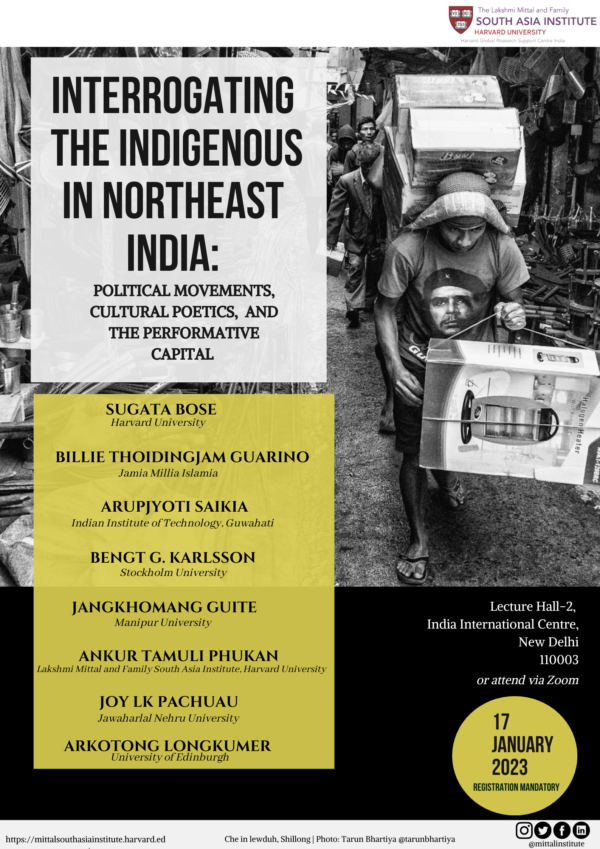Date and Time: January 17, 2023; 10.00am – 4.00pm
Venue: Lecture Hall-2, India International Centre, New Delhi
Register to attend in-person or Register to attend via Zoom
Please note: Registration is mandatory to attend the event (either via zoom or in-person)
Stream the event LIVE on Youtube
The contemporary politics of Northeast India is dominated by discourses of indigeneity. The circulation of the term “Indigenous” is not of ancient provenance. The wide–spread usage of the idea of the “primitive” and the “tribal” in the Northeast emerged out of colonial classifications of spaces and people in nineteenth-century British India. By the middle of the twentieth century, the category of “tribes” began to be actively used as a marker of identity and for the politics of recognition in different representations to the government. In the post-colonial period, the quest for tribal recognition crystallized into enduring cultural and political mobilizations focusing on the question of colonial and post-colonial (mis)recognition by the State(s), and the question of violence — epistemic or otherwise.
As these movements increasingly explored their radical potentials, the Indian security apparatus launched a series of counter-insurgent measures to quell these frontier discontents. The crossfire resulted, as many analyses in recent times have shown, in considerable “democratic deficits” in the region. At the same time, in a climate of depoliticization of fundamental questions, the contemporary moment has seemingly witnessed the circulation of a new set of simplistic binaries — indigenous/settler, insider/outsider, or tribal/nontribal” (Baruah, 2020) which risks legitimizing new patterns of exploitation, dispossession, subordination and sub-citizenship.
In this context, it is critical to interrogate indigeneity and its formidable biography in Northeast India. Instead of pronouncing its truth on its supposed basis in some originary moment, this conference would like to trace the “indigenous” as a historical category, investigating the ways in which the indigenous question has become a shared language of social critique in the region. We aim to examine the production of grammars and scripts of indigeneity, how agency, intention and subject-formation co-emerge through everyday encounters with the material world. We will also explore the structure of formation of indigeneity as a political and social category, its proliferations in specific temporalities, for instance, through different interactions with capital, neo-liberal politics of pristine primitive body, ecological and agrarian interactions, radical cultural and political movements, music and literature, and through vernacular politics.
Sessions
Keynote Lecture: In Search of Modern Assam- Dreams, Promises and Anxieties of the Long 1950s
10 AM – 11 AM
The keynote lecture gives an overview of Assam’s political, cultural and economic challenges immediately after 1947 to establish itself as an Indian state. The lecture recounts Assam’s domestic economic challenges and her cultural ambitions, which shaped her political destiny during the second half of the 20th century, with a focus on how the early decades of decolonization saw the unleashing of a range of new social energies and political forces that soon became critical to the making of modern Assam.
Chair: Sugata Bose, Gardiner Professor of Oceanic History and Affairs, Harvard University
Keynote Speaker: Arupjyoti Saikia, Professor of History, Indian Institute of Technology, Guwahati
Panel 1: Vernacular Politics, Ethnic Sovereignties and Politics of Hills and Plains
11:30 AM – 1 PM
Different vernacular discourses and their co-constitutions with different community sovereignties and neo-liberal resource politics have created new modalities of Indigeneity, creative anxieties, and imaginations of hills and plains within the region.
Chair: Arupjyoti Saikia, Professor of History, Indian Institute of Technology, Guwahati
Speakers: Bengt G. Karlsson, Professor of Social Anthropology, Stockholm University
Jangkhomang Guite, Associate Professor, Department of History, Manipur University
Billie Thoidingjam Guarino, Jamia Millia Islamia
Panel 2: Indigeneity and the Politics of Performance
2:00 PM – 3:30 PM
This session will explore the performative aspects of indigeneity — how indigenous identity is performed through different political movements, in historical trajectories, and ecological imaginations.
Chair: Sugata Bose, Gardiner Professor of Oceanic History and Affairs, Harvard University
Speakers: Joy LK Pachuau, Associate Professor, Centre for Historical Studies, Jawaharlal Nehru University, New Delhi
Arkotong Longkumer, Senior Lecturer in Modern Asia, University of Edinburgh
Ankur Tamuli Phukan, India Fellow, Lakshmi Mittal and Family South Asia Institute, Harvard University

